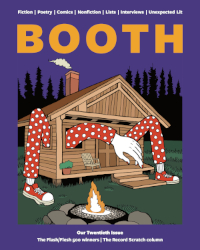It had been easy to agree that Mr. Reed would have to die, for reasons no one in the town felt bore repeating. The name of their community was Floyd, and Floyd prized discretion, so there was little recounting of Hal Reed's crimes, or those of anyone else. It was better to kill him than to talk of what he'd done. On this point even the minister agreed.
Floyd had also come to quick agreement about how the cover-up would be done. Of course they would not discuss the killing any more than they would what precipitated it, except in closed meetings at the town hall, and they would file a missing persons report, and should anyone come asking after him – which was unlikely – they would only say Hal Reed was gone, and perhaps insinuate something about a long-distance girlfriend in one of the western interior states. One of those Internet sex perverts, no doubt.
The trouble came when it was time to dispose of the body.
Hal Reed was laid out on the desk that served as a podium in the city hall, eyes weighted shut with old pennies, fists still clenched (and the left embedded with shards of the controller's plastic), packed in ice, from which thick vapors rose.
There was a crematorium in a neighboring city, but this would not be sufficiently discreet. (Surely those places made you identify the deceased.)
There were several citizens of Floyd who thought it best to boil the flesh away and bury the bones. Doris Crabtree said they should attempt a cremation themselves and scatter the ashes.
Paula Sharp, a farmer, observed that her pigs would eat nearly anything.
Steve Price had been researching dangerous chemicals in which the body could be dissolved, leaving only a fine white powder like baking soda.
Warren Reed, Hal's estranged older brother and a former student of anthropology, had been studying the Voodoo practices of apocryphal African cults. The growth of this interest was somehow connected to the growth of a lump behind his testicles, about which he had told no one. He suggested that they eat the body to absorb its strength, and also out of respect for the deceased.
Fat Steve, twenty-six, had lived alone in his mother's house ever since she died from sudden cardiac arrest. The volunteer firefighters of Floyd had been called after the ambulance came, and they had knocked down three-foot sections of wall with sledgehammers in order to extract her body while the paramedics smoked out back. Fat Steve shouted over the rising discord, "Having deprived this man of his life, we could at least give him a proper burial!"
For the first time in several decades, the neighbors fought with each other loudly, and in public. Owen Peachtree struck Mr. Cobb, who was kind enough to ignore it. Meanwhile flies were settling on Hal Reed's body, and his widow had begun to cry.
Mayor Osborne called the meeting to order by striking the desk where Mr. Reed lay with his coffee cup, which said, "NUMBER ONE MOM." He proposed another vote like that which had started them down this path in the first place.
Every method was put to the vote, and each member voted for his or her own method, so that no real majority could form.
"I've got a solution that should work for all of us," said Ross Reed, Hal's son by his first marriage, who was seventeen, paid $75 a month to live in his girlfriend's family's basement, and wore a leather jacket to obscure his growing paunch, even when it was too warm. "Since none of us can agree on what should be done with his body, we should carve him into pieces – one for each. And each can dispose of our share as we please."
The town handyman had foreseen his tools might be needed and brought them from his rusted Ford.
Mr. Reed was divvied up among Floyd. They did their best to keep their portions equal, measuring each helping by his left middle finger, with the exception of indivisible units like the eyes, and heart, which proved too hard for cutting. His brother Warren was given four inches of large intestine. Fat Steve got the penis. Ross Reed took an eye.
The widow Reed was given the heart because it was known to be hers.



